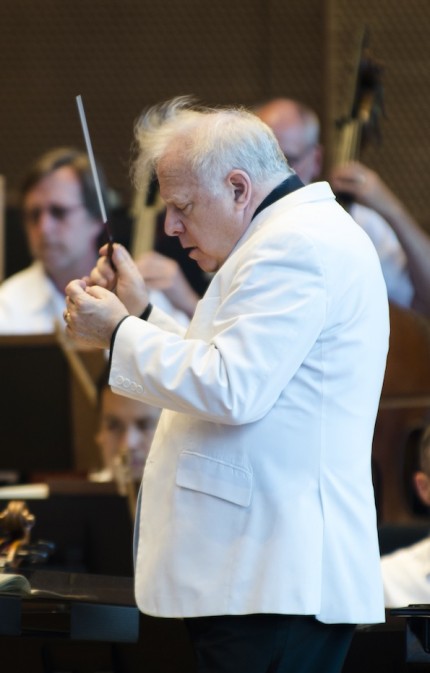Slatkin returns to Grant Park with a riveting Shostakovich reprise

“It’s great to be back at Grant Park,” said Leonard Slatkin from the stage of the Pritzker Pavilion, the conductor having returned for a concert Friday night with the Grant Park Orchestra in the festival’s 80th anniversary season. The audience clearly felt the same, greeting Slatkin’s entrance with cheers and a prolonged ovation.
While he is more familiar to local audiences from his downtown appearances with the Chicago Symphony Orchestra over the past three decades, Slatkin also served as music director of the Grant Park Music Festival for two brief seasons in the late 1970s. In many ways, Slatkin’s quirky and audacious programming set the adventurous tone for Chicago’s lakefront festival, which continues under Carlos Kalmar today.
That venturesome quality was surely reflected in Friday’s freewheeling lineup, which encompassed Chabrier, Shostakovich and a contemporary piano concerto performed by the composer.
In 1979 Slatkin led the Grant Park forces in the American premiere of Shostakovich’s The Execution of Stepan Razin. Slatkin reprised that work Friday in its first festival performance since the premiere 35 years ago.
Written in 1964, Shostakovich’s Stepan Razin draws on a long poem by Yevgeny Yevtushenko about the title 17th-century Cossack rebel leader who was executed by the Czar. The Soviets found the violent Razin a useful political symbol to be employed as anti-czarist folk hero. Still, such is the raw power and intensity of feeling in The Execution of Stepan Razin, it’s hard not to feel there is some subversive contemporary inspiration from Shostakovich, reflecting the murderous Soviet regime in this work written a decade after Stalin’s death.
Slatkin is often at his best in challenging works like this, and so it proved again Friday in a riveting performance of this 25-minute cantata. The conductor led a taut, gripping and atmospheric rendering, building inexorably to the moment of Razin’s execution by beheading and the horrific image of his decapitated head mocking the tsar.
Alfred Walker was a terrific soloist, his stentorian yet refined bass-baritone intensely compelling in his role as Razin and narrator. Under Slatkin, the Grant Park Orchestra played with daunting ferocity. Christopher Bell’s Grant Park Chorus delivered one of its finest outings of the summer in its vivid and richly characterful role as the malleable Russian mob, moving from spitefulness toward Razin to grudging respect and finally awed terror.
On the first half of the program Michel Camilo, a longtime Slatkin colleague, performed his own Piano Concerto No. 2, “Tenerife” inspired by the Dominican pianist-composer’s time spent in the Canary Islands.
Equally at home in the jazz as well as classical worlds, Camilo possesses a powerful, even awe-inspiring technique, which his concerto was clearly designed to exploit. Rarely will one hear such furiously pounded ostinatos or experience such dizzyingly fast blizzards of notes. The central Largo provides some relief with a nocturnal reverie, highlighted by a lyrical duo for piano and solo cello.
Yet most of Camilo’s unsubtle concerto is wildly over the top, an unconvincing mix of subtropical echt-Rachmaninoff (minus the tunes) and Liberace on methamphetamines. Ultimately, the opulent climaxes and violent bravura prove more exhausting than enlightening. Who knew the Canary Islands were so noisy?
The audience clearly felt differently, instantly jumping to their feet to award the inexhaustible Camilo a vociferous standing ovation. The pianist came back out for a solo encore of his Caribe, which offered an even more alarming display of staggering speed and prestidigitation. Camilo must have two extra fingers on each hand.
The evening was framed by a pair of orchestral showpieces that served effectively as prelude and postlude to the main works on the program.
The evening opened with a vibrant reading of Chabrier’s Espana. Slatkin led a brilliant, full-bodied performance of this Spanish showpiece with personality-plus wind playing from the Grant Park musicians.
After the bleak tragedy of Stepan Razin, Borodin’s whirling Polovtsian Dances made a somewhat jarring contrast but wound up providing a fine punchy coda to the evening. Slatkin drew a thrilling and atmospheric performance of high-stepping panache, bringing out Borodin’s exotic coloring and deftly balancing the orchestra, voices and percussion even at full volume. The Grant Park Chorus was simply glorious, singing with rich-toned, mellifluous and powerful corporate vocalism.
It was all gain to have Leonard Slatkin back at Grant Park. Let’s hope he returns to Chicago as a regular summer visitor.
The program will be repeated 7:30 p.m. Saturday. gpmf.com
Posted in Performances



